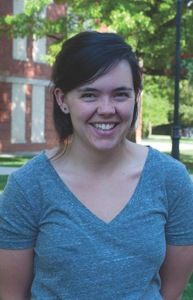

Megan King
Megan King started taking photographs when she was 6, but says she had no idea what she was doing. That changed in 2010 when she took a photography class at East Tennessee State University, "I knew I was hooked. The following semester I took the next photo class and changed majors before the semester was over."
She says photography is how she looks at relationships. "I'm interested in people and how they relate to one another or how people relate to the land. I'm interested in visual relationships between things, emotional relationships and physical relationships. Photography is the medium I use to focus on those things."
Her biggest influences are Joshua Greer and Mike Smith, two of her professors. "I think it's hard to take classes for two years with two consistent professors and not be influenced by them. My first three photo classes were all with Joshua, so everything I knew about photography I was learning from him or because of him. When I would go searching for work to look at, I would often look at his and Mike's because that's what I knew. They both make great work and have been instrumental influences in my development as a photographer."
Megan graduated with a dual major in art and Spanish and melded those two disciplines into "Hispanic Appalachia."
"In 2012 I received a Student Faculty Collaborative Grant from the ETSU Honors College to work on my project "Hispanic Appalachia.' I was able to work on that with Mike Smith, which was really great. For my degree, students are required to work with organizations in the community, which is how I was made aware of the large and growing Latino community in the area. I began the project though, because it's an important topic; diversity is important and should be celebrated."
"My photographs focus on Latino culture in the changing social landscape of Southern Appalachia. By photographing businesses, people, churches, homes and other aspects of the community, I am attempting to show the importance of emerging diversity in this historically conservative region of the United States. In the photographs, Hispanic culture is represented by vibrant colors, food, clothes and often decorations. These qualities create a visual juxtaposition to this region's cultural heritage; however, it is important to see that the Hispanic and Appalachian cultures can blend in a nearly indiscernible manner."
A few pieces from the project were featured on NPR to illustrate an article titled "Stereotypes of Appalachia Obscure a Diverse Picture," written by Sarah Baird. Megan was also interviewed for that article. Work from "Hispanic Appalachia" has been featured on Oxford American's photo section, Eyes on the South, and most recently by The Daily Mail.
"It was a little bit surreal and definitely exciting to have photos chosen for an NPR story," Megan says. "It was also a great experience. Sarah Baird was very pleasant and great to work with.
"Personally, it meant a lot. I've received several encouraging emails as a result of the article that made me glad to be doing this. Professionally, I've received a good bit of recognition from the article and several opportunities have presented themselves because of that recognition."
Megan plans to continue to work on Hispanic Appalachia and apply to graduate school. She is also an editor for a new project, "Looking at Appalachia, 50 Years After the War on Poverty," started this year by Roger May.
According to the project's website, "Many of the War on Poverty photographs, whether intentional or not, became a visual definition of Appalachia. These images have often drawn from the poorest areas and people to gain support for the intended cause, but unjustly came to represent the entirety of the region while simultaneously perpetuating stereotypes.
"In an attempt to explore the diversity of Appalachia and establish a visual counter point, this project will look at Appalachia 50 years after the declaration of the War on Poverty. Drawing from a diverse population of photographers within the region, this new crowd-sourced image archive will serve as a reference that is defined by its people as opposed to political legislation."
Megan is from Bristol, Tenn., and is based in Johnson City, Tenn., where she is a resident artist at East Tennessee State University.